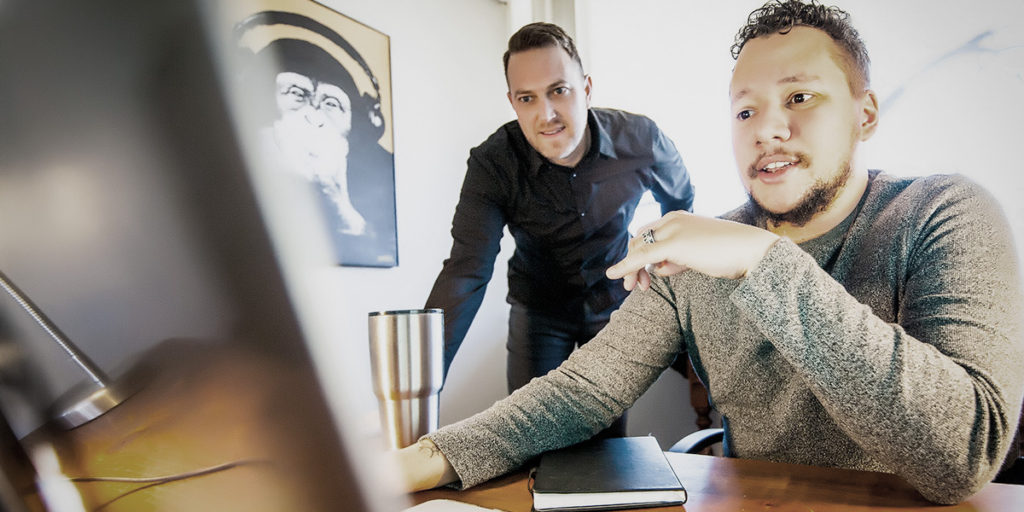CTM Podcast Ep 61.
How to get clients for your small business and importance of local search
Brad Post, Create the Movement
Dominick Montgomery, Create the Movement
Brad Post, Create the Movement, host: Welcome back to Create the Movement podcast. This is Brad Post, and I’m here with our Chief Marketing Officer Dominick Montgomery. Dominick, how are you doing?
Dominick Montgomery, Create the Movement: Hey, Brad. I’m good. Thanks for having me.
BP: Good, man. Good. I know we communicate daily with the multiple existing clients that we have here at Create the Movement. Dominick’s doing a great job at the multiple tasks that we give to him. Sometimes he’s not always able to be on the podcast. Glad that we got to connect and record our many conversations that we have.
DM: I am too.
BP: The topic of this podcast is ‘How to get more clients for your small business.’ Dominick and I have, in the past, probably five years, worked with a lot of larger companies, attorneys, that had a pretty decent budget to work with for their marketing campaign. There were some pretty competitive markets out there. Right, Dominick?
DM: Absolutely.
The Problem with Lead-generating Companies
BP: That we’ve had to work in. Most of these competitive markets have to have a pretty large spend to get found online and to get more clients. So, we’ve kind of shifted over the past six months because our passion is working with small businesses. We’ve gone into some construction areas like roofing companies and plumbing companies and stuff like that.
The one thing we found is that there’s a difference in what we do and what a lot of the construction-type companies are, not necessarily trained, but their marketed to do. Going with one of these lead-generating companies, we’re not mentioning them by name, but where you pay for a certain number of credits to get a lead. And then that lead, in turn, goes to you and four of your competitors. You pay $75 for a lead and they get the five different quotes and whoever’s the quickest and the least amount, probably gets the job. Right, Dominick?
DM: Right.
BP: The frustrating thing is that’s kind of a failing cycle. You continue to pay for leads and you may pay for 10, 20, 30 depending upon your budget, and not get but maybe one, maybe two if you’re lucky. And it doesn’t pay for the amount that you spent on marketing.
Not only that, but you don’t get any assets that you’re building out of it. That’s one thing that Dominick and I’ve really done is put together a package, since we’ve worked for these larger companies, that works for small businesses and is more affordable. We built, what, $5000, $10000, $25000 websites in the past, but not very many, if any, small businesses can afford that.
DM: Right. That’s a good point.
BP: So, yeah, we put this package together and started offering different products that will get your company online and, in turn, build assets for your company. Such as a website, your online presence, different citations, your Google My Business. And Dominick, you’re going to be sharing a little bit about local search and the importance of that here in a minute.
I had lunch with a friend a couple of weeks ago who had a large construction company about 10 years ago. He had five or six trucks working for him – they were blowin’ and goin’. But he failed to shift with the new way of marketing which is online, and, in turn, he’s actually working for another company. His big company shut down. He was like, “If I had just bit the bullet and went online five years I wouldn’t be where I’m at. I’d be doing my own business rather than working for another company.”
DM: Wow.
BP: You hate to hear that. If you called to an entrepreneur or business person you’d like to stay in that. Most people that start their own business because they’ve worked in that area for a company, and realized that they weren’t doing business the way that they should. And so, you start your own thing. Right? That’s what Dominick and I did.
DM: Pretty much.
Building Long-Term Assets for Your Small Business
BP: And now’s really the time to make sure your business is online and your building assets for your company rather than spending money with another company trying to get low-quality leads.
DM: And those other companies they don’t just take your money. But they build themselves up, obviously. And then they market to these small companies and say, “Because we’re so big you should pay us to have a portion of our site.” Which goes back to what you were saying, that’s not building an asset for the company.
BP: Exactly.
DM: Six months down the road when you look at your expenses and see you paid $2000 to some online directory, and like you said, you’ve gotten one, maybe two leads in half a year. And you want to turn that off – now you’re left with nothing. If you’d invested all of that into your own stuff.
BP: Right.
DM: One thing I wanted to hit on with local search, and it kind of ties into this, having a medium to long-term mindset when it comes to this stuff, especially online digital marketing, you have to have a long-term mindset.
BP: That’s good.
DM: Because what you start right now you may not see the benefit of until six months down the road. But it’s never going leave because you spent the time to build it up. Sorry to hijack your point.
BP: No, no that’s great. I love having the long-term mindset. You spend a lot of money and realize it didn’t do anything for you. Six months down the road you realize, “Well, dang!”
DM: You have nothing.
Local Search – ‘Near Me’
BP: Right, right. Share a little bit on the local search, Dominick.
DM: Along the lines of us talking about small businesses, I think one thing that has gone unseen or unchecked, and this is kind of what you were saying. The guy says that marketing was changing and there was a move being made to doing marketing online. And he didn’t notice it until it was too late, or he didn’t care about it until it was too late.
BP: Exactly.
DM: So, I think that’s what’s happening now with local search. There’s local search and people know local search, but I think there’s a hyper-local search going on now. I was reading an article a couple of days ago where they said there’s been a dramatic increase of the keyword ‘near me.’ Like, a dramatic increase.
With Google seeing something like that, obviously, they’re going to shift their algorithm and shift their tools and search pages to cater to people looking for something near them. I always say essentially that’s what Google wants. Google wants you to think something and they give you the answer – that’s their main goal and they’ll be there in 10 years.
If people are searching for ‘near me’ how do you figure out, you as a small-business owner need to figure out how to let them know, “Hi. I’m here. I’m near you I’m here?” Because there are people around you looking for business. And I think that’s what we’ve found, too. If we get local companies to work with the quality of that client is sometimes better than someone who we work with overseas. Because we can touch them; they’re right there. We can gain that kind of relationship with them.
Me and Brad used to do monthly check-ins with clients and just pop by, sit down, and talk shop because that’s important. So, when it comes to local search, obviously you need to let people know you’re near them and Brad mentioned Google My Business – it’s a great way. But also you have to be in Maps. You have to have all of your Google stuff set up.
Meet Potential Clients During their Research Phase
But more importantly, and we do this with our packages, and this is one of the areas where we’re different than other companies who focus on bring you local lead, is people are searching for a specific service that’s near them. Let’s say you, as a business owner, you are that particular service. And if you show that’s great.
But there’s a whole different realm of people looking for a type of service near them, not a particular one, but a type of service near them. And maybe they’re posing a question like, “Are there any t-shirt printing shops in Los Angeles (in the city)?” Let’s say they’re not doing ‘near me’ they’re doing a particular city. So, what you need to pay attention to and what you need to strive to do, and what we’d strive to do, is meet the person who’s searching while they’re in that research phase.
So, let’s say that person’s looking for a t-shirt shop in LA, or he’s looking for a custom graphic t-shirt shop in LA. We’re going to try to, in our link building and the way that we write content and even the small-business owner can write content, to provide that searcher with the right information during their research.
It’s not a branded search. They’re not saying ‘Paul’s T-shirt Shop.’ They’re looking for a type of t-shirt shop somewhere near them. If they land on the content that you’ve prepared for them and the content is persuasive, the content is unique, and it’s put together on a great website, I think that is going to also help build traffic and build leads for your company.
I hope that makes sense.
BP: Absolutely.
DM: The main goal, what I’m trying to get to, is meet the person during the research phase. That’s what we want to do.
We have a client, and I’m not going to name names, but if they’re listening they’ll know who it is. We fell on a bounce-rate topic. And one of their pages we built out had amazing content. It told the searcher exactly what they needed to know and hit on different points. It had video, it had index, everything. It was a huge page. The bounce rate of that page was really high, but the time spent on the page was really high as well. I think it was five minutes or something like that. So, me and Brad were crunching the numbers and looking at the data, “Okay, here’s what’s happening”.
People are searching for something to with this article, or something in the realm of this topic, and they’re finding this page because this page ranks so well because it has all the info you need. And they’re staying on that page, reading it all and taking it in, and they’re making one of two actions. The first action is they’re leaving the page because they’ve absorbed they needed – they got their question answered and they moved on.
Or, the second action was they picked up the phone and they called the client. Because what that content did was show the searcher, “Okay, these people are experts on this topic. I need to call them and talk to somebody face-to-face and get my situation sorted.”
If we can strive to do stuff like that that’s really, really going to help bring business to your small business.
Billboards and Yellow Books
One more thing I wanted to hit on. You talked about the guy missing the online boat. I think it’s important for small-business owners to know that, yes you have to stay ahead of the curve when it comes to advertising and marketing. But here’s another shift that’s happening that I think people are missing out on. Traditional marketing: Yellow Pages, billboards, all that. That’s not dead. We’re not saying move everything online, but the price of traditional marketing, the cost of doing it the right way now has gone up.
What I mean is, if you’ve been paying $150,000 to have that back cover of a Yellow Book ad. You’ve been doing that for 12 years and they’ve locked in a price. Obviously, most people have stopped using Yellow Books. I think I’m okay with saying that. There may be a generation who still keeps them for the kids to sit up higher in their chairs. But, for the most part, people aren’t getting those to look at advertising. But, if you were to run a campaign, to do something very, very creative and something that pulls at somebody’s heart when they see it. And you’re not doing it for reasons to get business you’re doing it for branding purposes. You want to state a message, push an agenda, something like that. That price has gone up because all the creative that’s going to go into it.
So, if you’re still doing traditional marketing, look at shifting that to a more creative way. Because I don’t think people right now are going to be persuaded by a headshot of you in your shop and then a phone number. That’s just not going to happen.
Digital’s made it real easy to tell stories and to tell the story behind a business and to persuade people to like the business more than the competitor and to call. Made it easier to make that messaging clear when before we just had to depend on Yellow Pages and billboards and that’s how everybody did it.
So, I rambled a lot there, but I hope there’s some takeaways.
BP: No. It brought up a point, too. People want to be moved by the message. Look at all the Super Bowl commercials. We recently had the Super Bowl and a lot of it was cause marketing. I remember just after a few of them going, “Wow, that was a good commercial.” I was somewhat moved.
Just think differently and look to hire a company that can help you think differently so you don’t waste a lot of money. That’s where it comes down.
“We made it big. We can put up billboards.” What’s that billboard saying? Are you tracking conversions off of that billboard? Is there a way to track that? With online you can pretty much track just about everything that somebody’s doing and can really show the results quickly.
You had mentioned the ‘near me.’ With Google My Business it’s got Insights where you can see how many people ‘click to call’ or how many people ‘clicked for directions’ in a month’s time. There’s so much data online now. It’s great to be in it, but somewhat overwhelming with all the information that’s going out there. We’re just blessed to be able to follow the trends.
DM: Right. Good point.
BP: A year, or two, ago the ‘near me’ searches weren’t as fluent as they are now.
DM: Especially with voice search. People are at home, kids are at home. I’m sure with Alexa and Google Home there’s a lot of searches getting skewed by kids just saying, “Playground near me,” or something like that. But that’s how people talk. They’re looking for something near them, close to them.
I want to bring up a point we said about billboards. I loved how you said, “Find someone who can help you think differently when it comes to traditional marketing.”
MailChimp, I think everyone should be familiar with MailChimp. If not, they’re an email provider. They let you put together campaigns and send them. We love them – they’re awesome. They put together a billboard campaign. It costs millions of dollars. They put up a billboard in Times Square, in Los Angeles, Dallas, around some football stadiums, whatever. The only thing on that billboard was color and then their logo. There was no call to action, no phone number because MailChimp understands nobody’s going to ride past this and pick up the phone and call. And nobody’s going to go home and remember their URL. All they were doing for was branding purposes: “We’re so cool we’re just going to make some cool stuff and put it out there.” Millions of dollars.
That alone shows a different way of thinking that’s occurred. Spending millions of dollars to do something like that. And I think that’s cool and I would love to have millions of dollars to something like that.
BP: Right. Just to put our logo up.
Google Reviews and How to Deal with Bad Ones
DM: Yeah. One more thing I wanted to mention with Google My Business is reviews. I think people when they see reviews online they take those and internalize them as personal recommendations because it’s another person reviewing this company.
Bringing business in? Make sure you follow up and get them to leave you a review. And we’ve dealt with it this past month, Brad. A couple of clients received negative reviews, and we always encourage them to go in and resolve that with the person who might have been upset with the business. Try to resolve it. Make it look good. Respond online, respond openly. Don’t make it a private deal. Respond openly so other people can look at your reviews, say you have nine great reviews and one bad one, which is not usually the trend because usually only upset people leave reviews. That’s why Yelp exists. But if they see nine positive and one negative they look at that negative and they see that you’ve been interacting and trying to take care of the situation the right way. I think those nine, plus seeing that, will overcome anybody saying, “Well, I’m not going to call them because they had a bad review.”
Reviews are very important and they can show up in search results, too, besides your name. So, focus on that.
BP: We’ve seen a lot of bad reviews that weren’t even clients. So, if they even respond going, “Hey, sorry you gave us a one-star, but we don’t have a record of you as a client.” I think even saying that people look at reviews, and they’re like, “Okay, let’s look at this bad review. Oh, okay, they responded that this isn’t even their client. So, dismiss that.”
DM: That person is a crazy person.
Branding Your Keywords
BP: Right, right. This isn’t necessarily on the lines local search, but it brought up a story that I’d like you to share. You’d share the Wayfair way that they did their marketing. It’s more of a national, but can you share that?
DM: Yeah, so we were dealing with a client and we were doing research on their keywords. They were showing up real well for, I think, 94 keywords they were showing up first page which is awesome. So, I ran all of these keywords through AdWords keyword planner just to see search volume on each one. Just to make sure that we were ranking for terms that matter. And I was shocked to see that the client’s name, their brand name, was searched more than any other keywords on their site.
And that brought to mind a commercial that Wayfair, the online furniture store, runs. They ran a national campaign on TV during prime business hours across the world and the call to action in that commercial was ‘Need an area rug? Just Google ‘Wayfair + area rug.’ Do you need a new sofa? Just Google ‘Wayfair + sofa.’ And I said, “Oh, my gosh! Wayfair, they’re owning the keyword ‘area rug’ because they’re telling people to go search not for the word ‘area rug,’ but for ‘Wayfair area rug.’ So, they’re branding that keyword and they’re telling Google, “Hey, if somebody’s looking for an area rug, they’re probably looking for Wayfair area rug because millions of people are now searching this way.”
So, they changed the way that people searched which is crazy! So, with our client, now, we’re shifting and focusing more on branded keywords. If you have a t-shirt printing store in town and everyone knows you as ‘Dave’s T-shirt Shop.’ And you’re the top t-shirt shop there, but you see some competitors along the way. Why not brand your keywords with ‘Dave’s T-shirt shop,’ ‘Dave’s custom printing,’ ‘Dave’s ink?’ Dave’s, Dave’s Dave’s.
So then, whenever somebody’s searching for that particular keyword, your branded search might come up first. Because Google is essentially saying, “Anything having to do with this topic I need to append ‘Dave’s’ to it because they are the authority on that topic.”
So, that was a brilliant campaign by Wayfair. That was just so brilliant.
BP: That’s good. Let’s just wrap it up if you’re good with that.
DM: Cool deal. I had fun.
BP: How to get more clients for your small business and the importance of local search. We’d love to work with you. So, contact us today if you want to work with us. Any parting words, Dominick?
DM: Don’t pay a lot of money for the back of a Yellow Book.
BP: There you go. Yup. Don’t invest all of your marketing dollars into a lead-generating company that you won’t be building assets to, right?
DM: Right. There you go.
BP: Thanks for joining us and we’ll talk to you next time.











